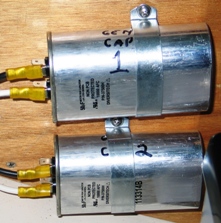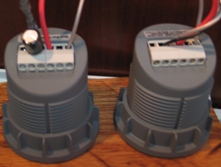After extensive research, design, and many years of use and operation, ZRD has developed a knowledge that not all instruments may be used or taken at face value. The two examples below
show how simple and inexpensive ($1 - $15) user modifications (should be done by manufacturers, or suggested in installation instructions) will result in more usefulness of a piece of
equipment or a more accurate instrument reading. In both examples, beneficial and proper results were obtained by simply adding a proper capacitor to the circuitry. Adding a capacitor(s)
is a very common remedy for problematic AC circuitry.
 |
Pictured at left is a custom installation option we performed to increase net output (155%) of the inverter/charger when operating off of the genset vs extremely stable, mega-$, pure
sine-wave shore power. The net result is that charging capacity is almost identical (~85-90%) whether 120vac is being provided by shore or genset power. This feature is beneficial
to all items using 120 Vac, but is most noticeable on sensitive electronic components.
In simple terms - The charger went from averaging 150 amps/hour when running on shore power down to 40 A/H when running on the genset supplied 120vac back up to 125-135 A/H after
adding the capacitors and running on the genset supplied "new" 120vac! |
 |
Pictured at left is another custom installation option we performed to reduce inaccurate displays (seen as much as 35%) on a Blue Seas 8247 AC Multimeter. Before the modification, the
instrument would pick up (via 8247's current transformer) useless harmonics that exist in lines (most common when using a battery charger) and exaggerates the actual useful load (amps).
After the modification, the 8247's readings were within (agreed) 5-15% (situation dependent) of accurate clamp on current reading instruments. |
|

